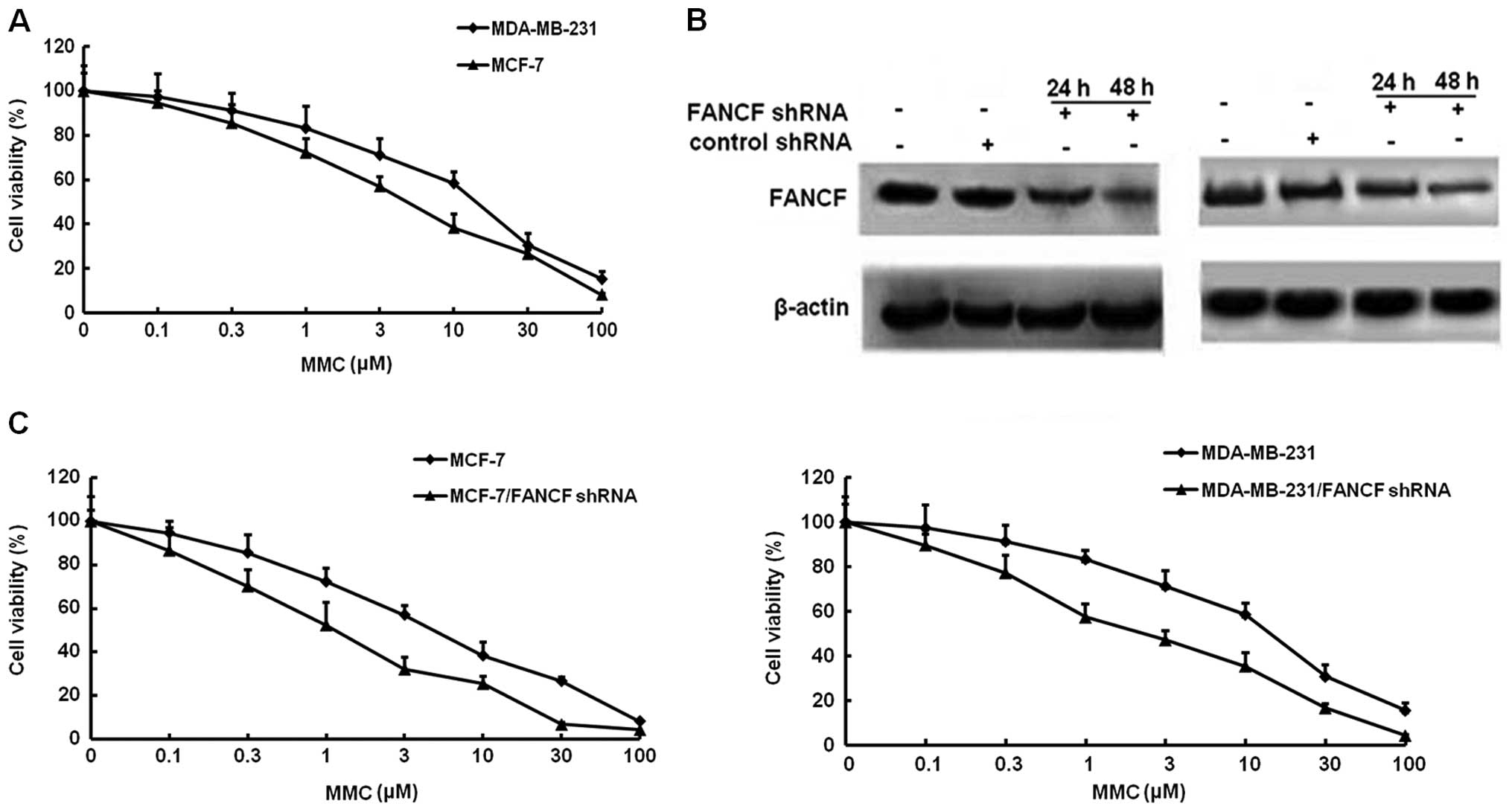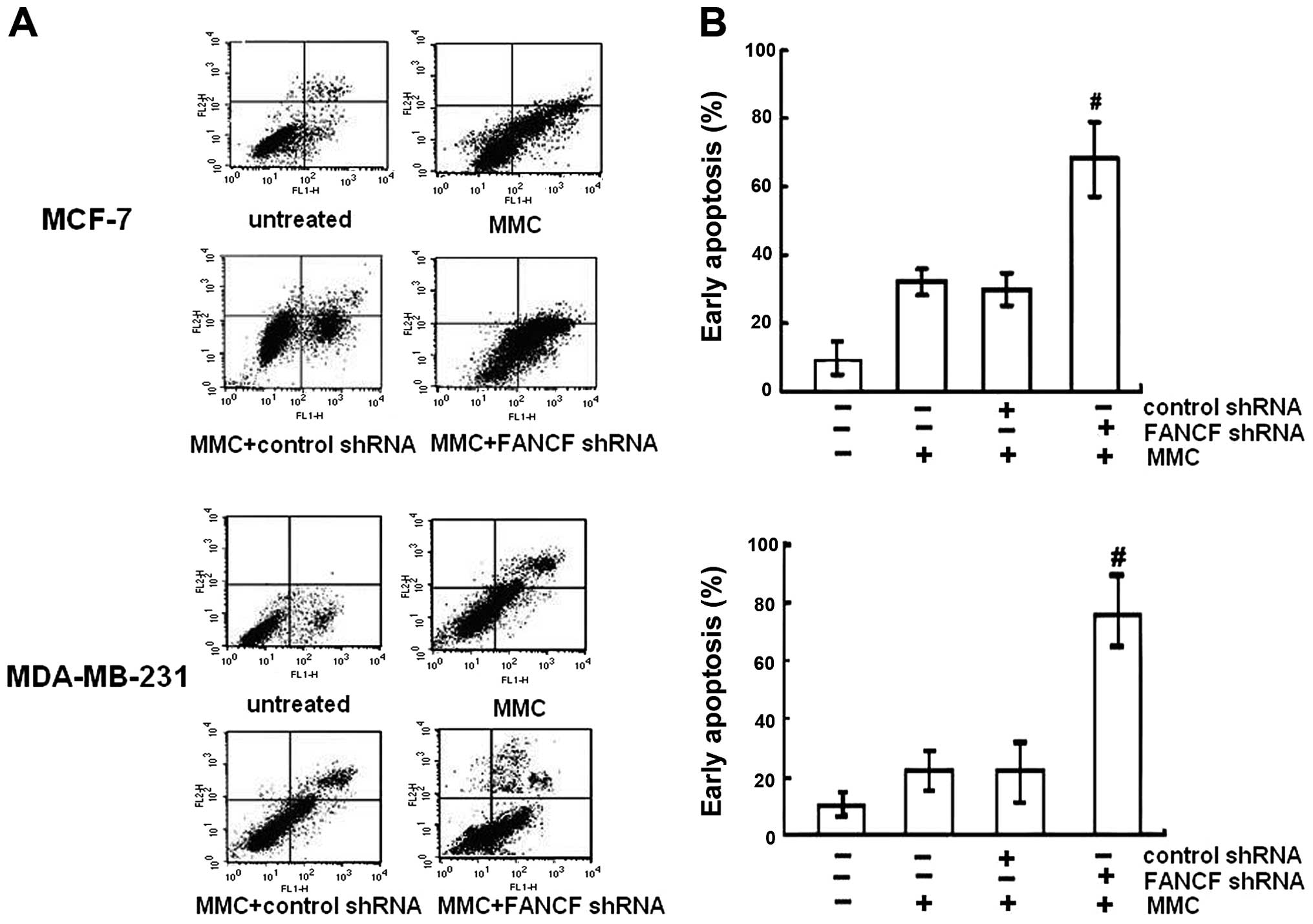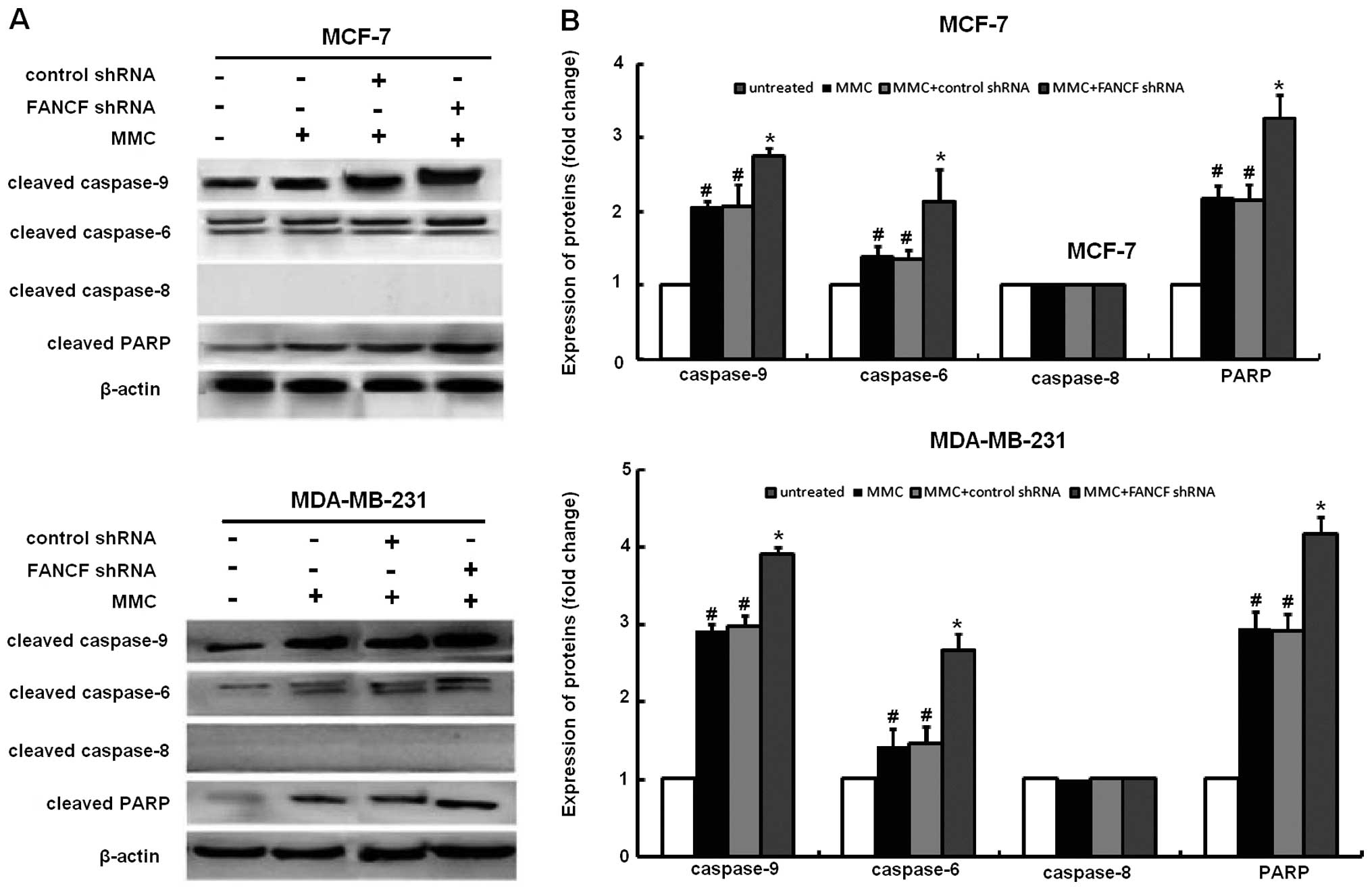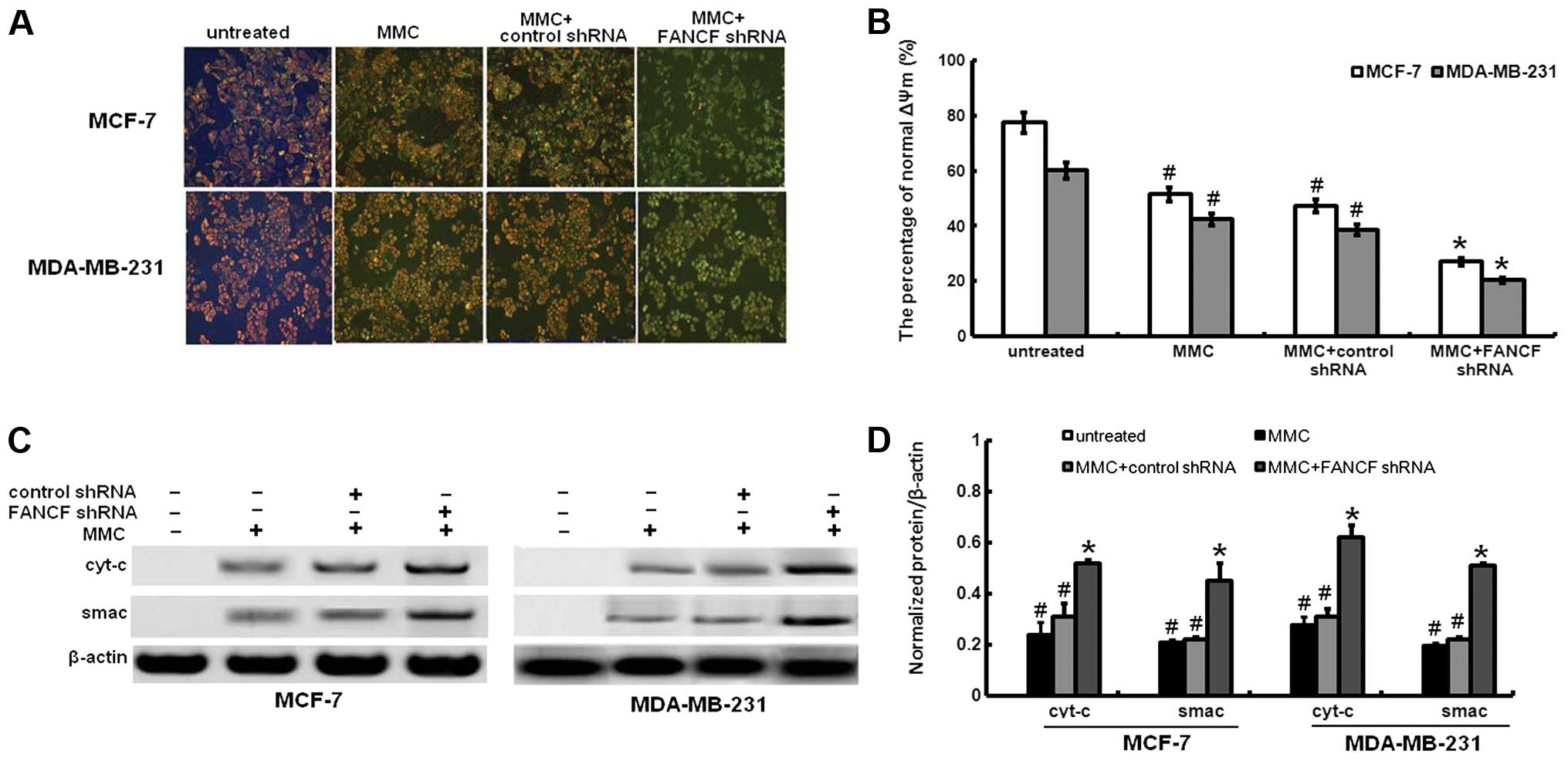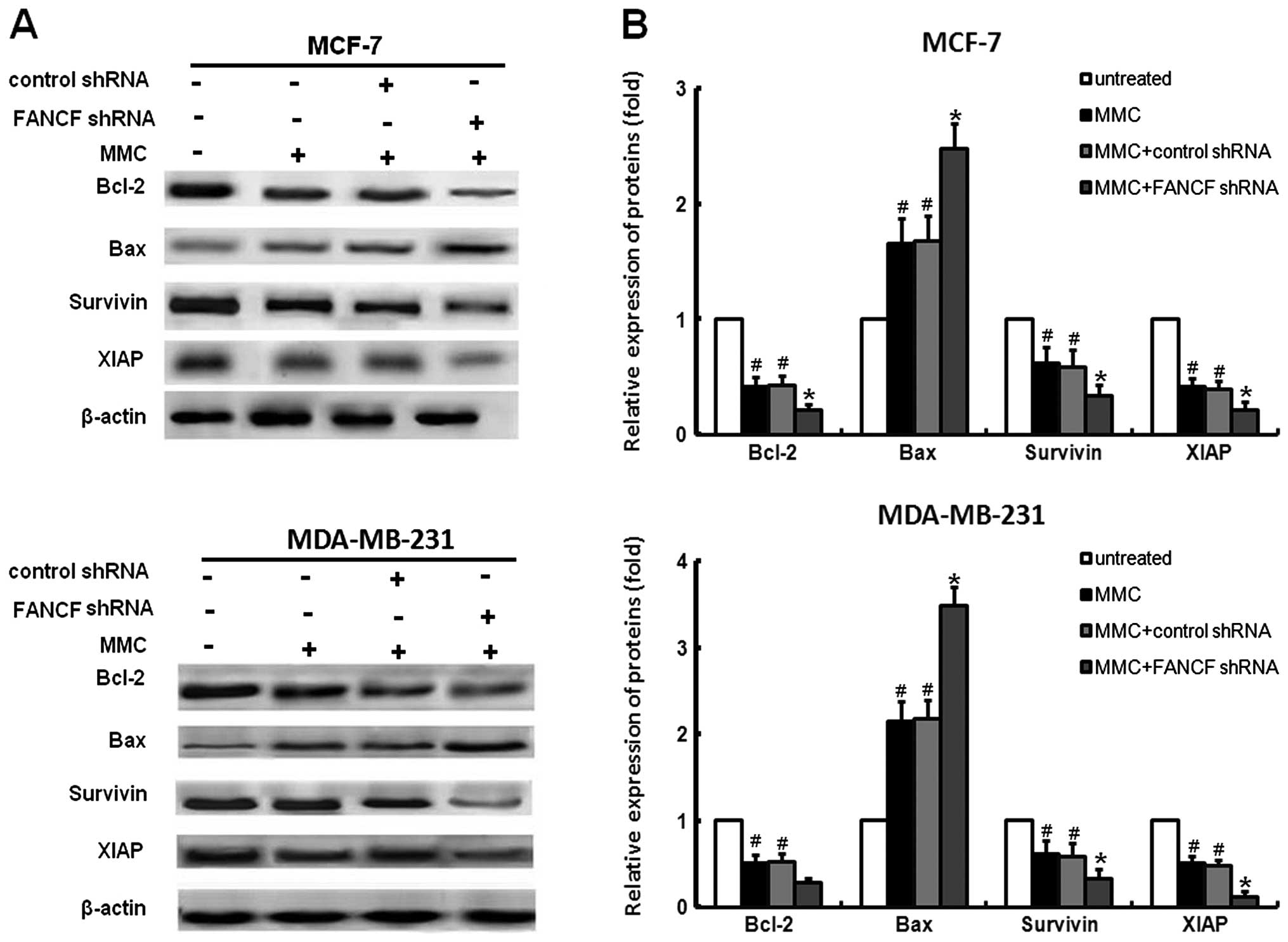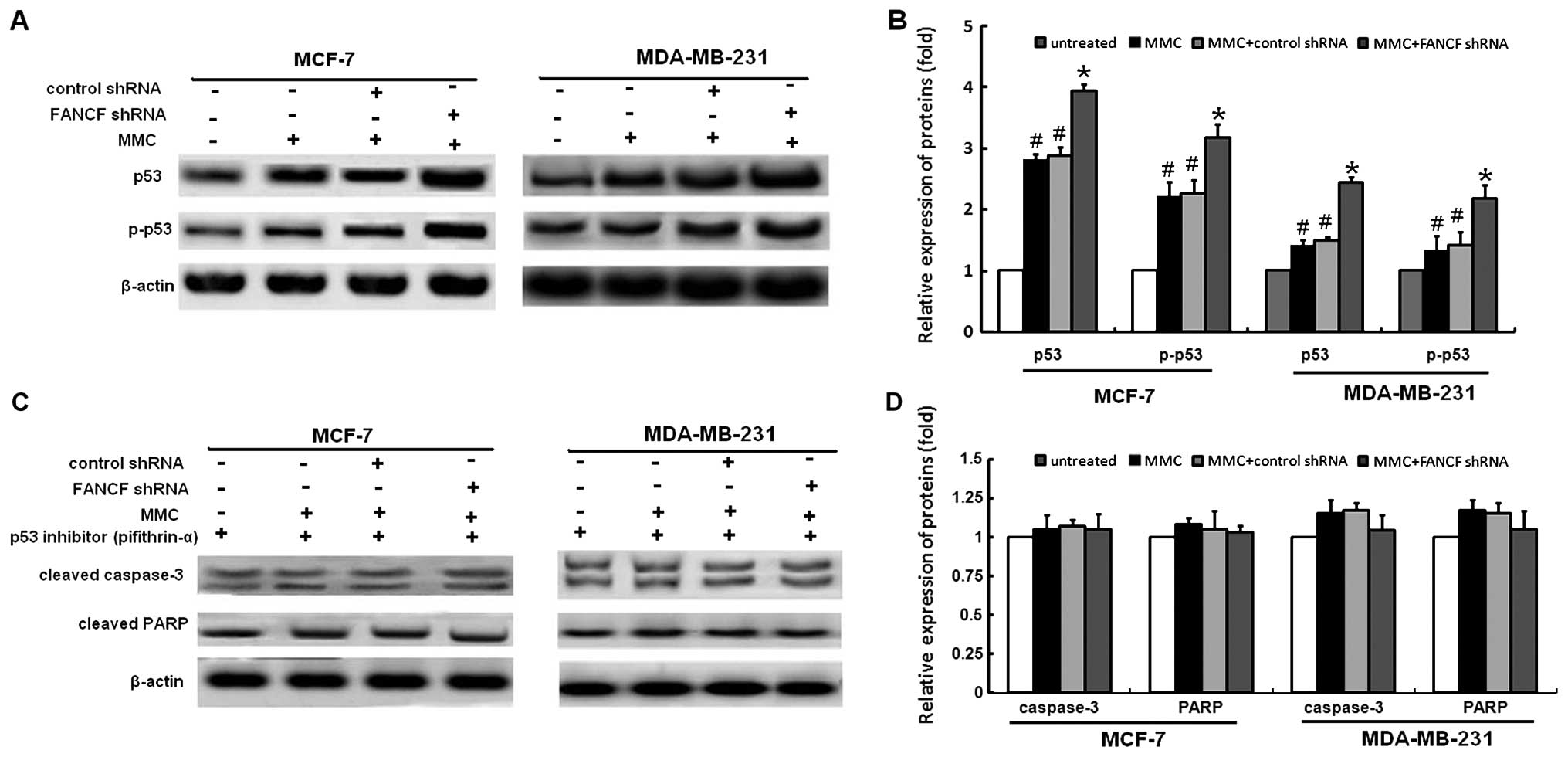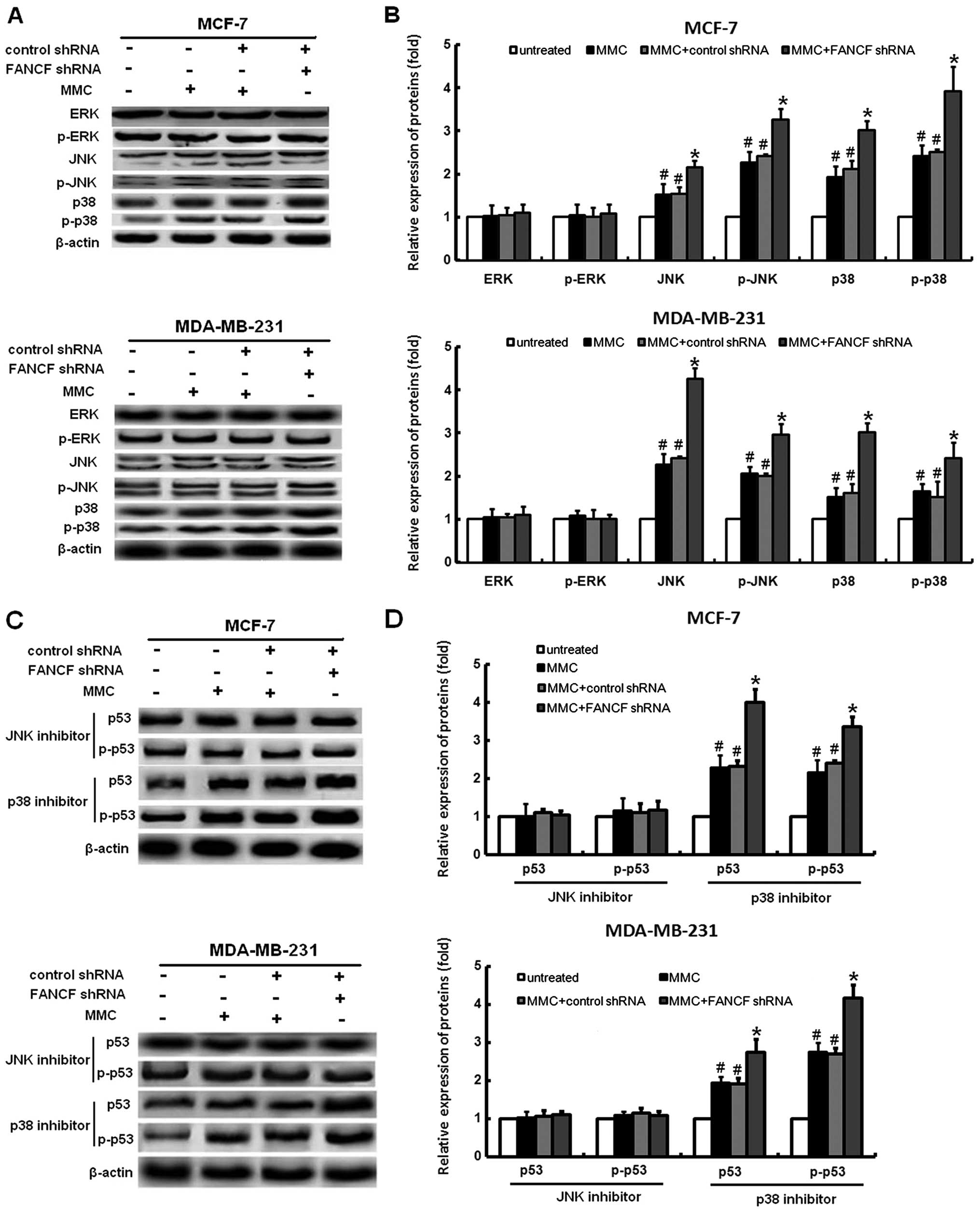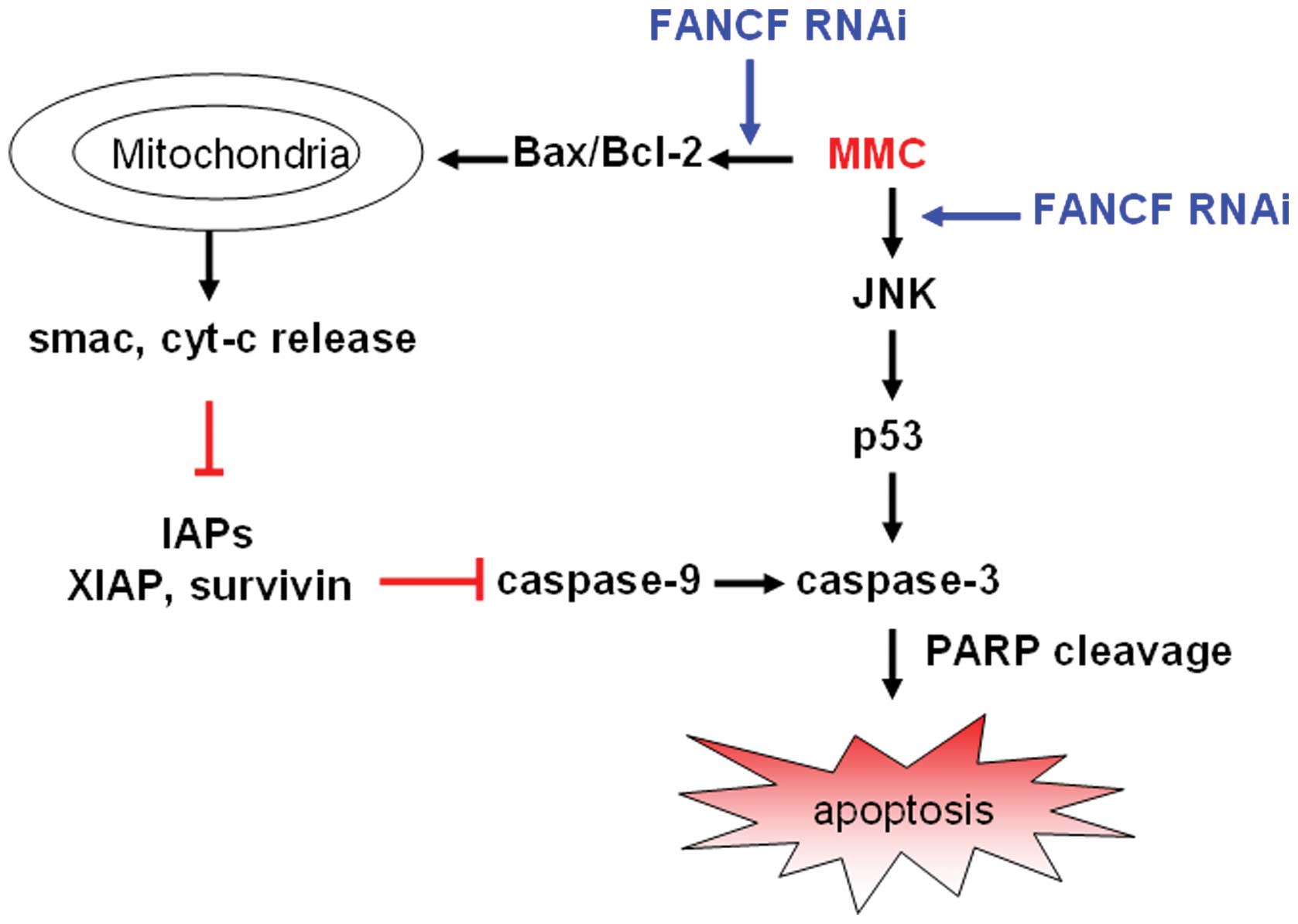|
1.
|
Parkin DM, Bray F, Ferlay J and Pisani P:
Global cancer statistics, 2002. CA Cancer J Clin. 55:74–108. 2005.
View Article : Google Scholar
|
|
2.
|
Celli CM and Jaiswal AK: Role of GRP58 in
mitomycin C-induced DNA cross-linking. Cancer Res. 63:6016–6025.
2003.PubMed/NCBI
|
|
3.
|
McHugh PJ, Spanswick VJ and Hartley JA:
Repair of DNA inter-strand crosslinks: molecular mechanisms and
clinical relevance. Lancet Oncol. 2:483–490. 2001. View Article : Google Scholar : PubMed/NCBI
|
|
4.
|
Bagby GC and Alter BP: Fanconi anemia.
Semin Hematol. 43:147–156. 2006. View Article : Google Scholar
|
|
5.
|
Stoepker C, Hain K, Schuster B, et al:
SLX4, a coordinator of structure-specific endonucleases, is mutated
in a new Fanconi anemia subtype. Nat Genet. 43:138–141. 2011.
View Article : Google Scholar
|
|
6.
|
Bogliolo M LA, Callén E, Castellà M,
Cappelli E, Ramírez MJ, Creus A, Marcos R, Kalb R, Neveling K,
Schindler D and Surrallés J: Histone H2AX and Fanconi anemia FANCD2
function in the same pathway to maintain chromosome stability. EMBO
J. 26:1340–1351. 2007.PubMed/NCBI
|
|
7.
|
Taniguchi T, Garcia-Higuera I, Xu B, et
al: Convergence of the fanconi anemia and ataxia telangiectasia
signaling pathways. Cell. 109:459–472. 2002. View Article : Google Scholar
|
|
8.
|
Garcia-Higuera I, Taniguchi T, Ganesan S,
et al: Interaction of the Fanconi anemia proteins and BRCA1 in a
common pathway. Mol Cell. 7:249–262. 2001. View Article : Google Scholar : PubMed/NCBI
|
|
9.
|
Chen Q, Van der Sluis PC, Boulware D,
Hazlehurst LA and Dalton WS: The FA/BRCA pathway is involved in
melphalan-induced DNA interstrand cross-link repair and accounts
for melphalan resistance in multiple myeloma cells. Blood.
106:698–705. 2005. View Article : Google Scholar : PubMed/NCBI
|
|
10.
|
Chen CC, Taniguchi T and D’Andrea A: The
Fanconi anemia (FA) pathway confers glioma resistance to DNA
alkylating agents. J Mol Med. 85:497–509. 2007. View Article : Google Scholar : PubMed/NCBI
|
|
11.
|
Taniguchi T, Tischkowitz M, Ameziane N, et
al: Disruption of the Fanconi anemia-BRCA pathway in
cisplatin-sensitive ovarian tumors. Nat Med. 9:568–574. 2003.
View Article : Google Scholar : PubMed/NCBI
|
|
12.
|
D’Andrea AD and Grompe M: The Fanconi
anaemia/BRCA pathway. Nat Rev Cancer. 3:23–34. 2003.
|
|
13.
|
Auerbach AD: Fanconi anemia and its
diagnosis. Mutat Res. 668:4–10. 2009. View Article : Google Scholar : PubMed/NCBI
|
|
14.
|
Lyakhovich A SJ: New roads to FA/BRCA
pathway. Cell Cycle. 6:1019–1023. 2007.PubMed/NCBI
|
|
15.
|
Olopade OI and Wei M: FANCF methylation
contributes to chemoselectivity in ovarian cancer. Cancer Cell.
3:417–420. 2003. View Article : Google Scholar : PubMed/NCBI
|
|
16.
|
Narayan G A-PH, Nandula SV, Basso K,
Sugirtharaj DD, Vargas H, Mansukhani M, Villella J, Meyer L,
Schneider A, Gissmann L, Dürst M, Pothuri B and Murty VV: Promoter
hypermethylation of FANCF: disruption of Fanconi Anemia-BRCA
pathway in cervical cancer. Cancer Res. 64:2994–2997.
2004.PubMed/NCBI
|
|
17.
|
Li Y, Zhao L, Sun H, et al: Gene silencing
of FANCF potentiates the sensitivity to mitoxantrone through
activation of JNK and p38 signal pathways in breast cancer cells.
PLoS One. 7:e442542012. View Article : Google Scholar : PubMed/NCBI
|
|
18.
|
Yu J, Zhao L, Li Y, et al: Silencing of
Fanconi anemia complementation group F exhibits potent
chemosensitization of mitomycin C activity in breast cancer cells.
J Breast Cancer. 16:291–299. 2013. View Article : Google Scholar : PubMed/NCBI
|
|
19.
|
Pirnia F, Schneider E, Betticher DC and
Borner MM: Mitomycin C induces apoptosis and caspase-8 and -9
processing through a caspase-3 and Fas-independent pathway. Cell
Death Differ. 9:905–914. 2002. View Article : Google Scholar : PubMed/NCBI
|
|
20.
|
Kim TI, Choi SI, Lee HK, Cho YJ and Kim
EK: Mitomycin C induces apoptosis in cultured corneal fibroblasts
derived from type II granular corneal dystrophy corneas. Mol Vis.
14:1222–1228. 2008.PubMed/NCBI
|
|
21.
|
Janicke RU: MCF-7 breast carcinoma cells
do not express caspase-3. Breast Cancer Res Treat. 117:219–221.
2009. View Article : Google Scholar : PubMed/NCBI
|
|
22.
|
Fritsche M, Haessler C and Brandner G:
Induction of nuclear accumulation of the tumor-suppressor protein
p53 by DNA-damaging agents. Oncogene. 8:307–318. 1993.PubMed/NCBI
|
|
23.
|
Abbas T, Olivier M, Lopez J, et al:
Differential activation of p53 by the various adducts of mitomycin
C. J Biol Chem. 277:40513–40519. 2002. View Article : Google Scholar : PubMed/NCBI
|
|
24.
|
Tournier C, Hess P, Yang DD, et al:
Requirement of JNK for stress-induced activation of the cytochrome
c-mediated death pathway. Science. 288:870–874. 2000. View Article : Google Scholar : PubMed/NCBI
|
|
25.
|
Wu GS: The functional interactions between
the p53 and MAPK signaling pathways. Cancer Biol Ther. 3:156–161.
2004. View Article : Google Scholar : PubMed/NCBI
|
|
26.
|
D’Andrea AD: The Fanconi anemia/BRCA
signaling pathway: disruption in cisplatin-sensitive ovarian
cancers. Cell Cycle. 2:290–292. 2003.PubMed/NCBI
|
|
27.
|
Wong RS: Apoptosis in cancer: from
pathogenesis to treatment. J Exp Clin Cancer Res. 30:872011.
View Article : Google Scholar : PubMed/NCBI
|
|
28.
|
He M, Sun HG, Hao JY, et al: RNA
interference-mediated FANCF silencing sensitizes OVCAR3 ovarian
cancer cells to adriamycin through increased adriamycin-induced
apoptosis dependent on JNK activation. Oncol Rep. 29:1721–1729.
2013.
|
|
29.
|
D’Andrea AD and Grompe M: Molecular
biology of Fanconi anemia: implications for diagnosis and therapy.
Blood. 90:1725–1736. 1997.
|
|
30.
|
Tang D, Lotze MT, Kang R and Zeh HJ:
Apoptosis promotes early tumorigenesis. Oncogene. 30:1851–1854.
2011. View Article : Google Scholar : PubMed/NCBI
|
|
31.
|
Cory S and Adams JM: The Bcl2 family:
regulators of the cellular life-or-death switch. Nat Rev Cancer.
2:647–656. 2002. View
Article : Google Scholar : PubMed/NCBI
|
|
32.
|
Tait SW and Green DR: Mitochondria and
cell death: outer membrane permeabilization and beyond. Nat Rev Mol
Cell Biol. 11:621–632. 2010. View
Article : Google Scholar : PubMed/NCBI
|
|
33.
|
Shimizu S, Narita M and Tsujimoto Y: Bcl-2
family proteins regulate the release of apoptogenic cytochrome c by
the mitochondrial channel VDAC. Nature. 399:483–487. 1999.
View Article : Google Scholar : PubMed/NCBI
|
|
34.
|
Zhou ZX, Zhang JH, Zhang LJ, Huang XH and
Liu ZJ: Expression of survivin mRNA and protein in
mitomycin-treated hepatoma carcinoma Hepa1-6 cells. Nan Fang Yi Ke
Da Xue Xue Bao. 28:230–232. 2008.(In Chinese).
|
|
35.
|
Miyashita T and Reed JC: Tumor suppressor
p53 is a direct transcriptional activator of the human bax gene.
Cell. 80:293–299. 1995. View Article : Google Scholar : PubMed/NCBI
|
|
36.
|
Oda E, Ohki R, Murasawa H, et al: Noxa, a
BH3-only member of the Bcl-2 family and candidate mediator of
p53-induced apoptosis. Science. 288:1053–1058. 2000. View Article : Google Scholar : PubMed/NCBI
|
|
37.
|
Nakano K and Vousden KH: PUMA, a novel
proapoptotic gene, is induced by p53. Mol Cell. 7:683–694. 2001.
View Article : Google Scholar : PubMed/NCBI
|
|
38.
|
Liu TX, Howlett NG, Deng M, et al:
Knockdown of zebrafish Fancd2 causes developmental abnormalities
via p53-dependent apoptosis. Dev Cell. 5:903–914. 2003. View Article : Google Scholar : PubMed/NCBI
|
|
39.
|
Jiang YY, Wang HJ, Wang J, Tashiro S,
Onodera S and Ikejima T: The protective effect of silibinin against
mitomycin C-induced intrinsic apoptosis in human melanoma A375-S2
cells. J Pharmacol Sci. 111:137–146. 2009. View Article : Google Scholar : PubMed/NCBI
|
|
40.
|
Raman M, Chen W and Cobb MH: Differential
regulation and properties of MAPKs. Oncogene. 26:3100–3112. 2007.
View Article : Google Scholar : PubMed/NCBI
|
|
41.
|
Liu J and Lin A: Role of JNK activation in
apoptosis: a double-edged sword. Cell Res. 15:36–42. 2005.
View Article : Google Scholar : PubMed/NCBI
|















